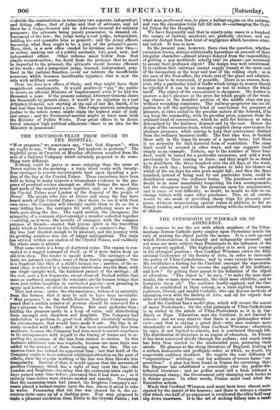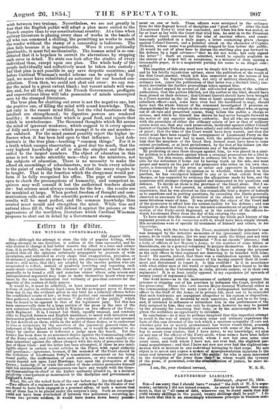THE CENSORSHIP OF WISEM.A_N Olt OF ASHBURTON.
IT is curious to see the art with which members of the Ultra- montane Roman Catholic party employ upon Protestant minds the -rule of making the object justify the means. It is a rule against -which Protestantism is instantly and indignantly aroused; and yet none are more subject than Protestants to the influence of the rule properly applied. The highest policy is to seek your enemy in his strongest position : thus Cardinal Wiseman enters the Edu- cational Conference of the Society of Arts, in order to insinuate the policy of Ultra-Catholicism; and to some extent he succeedi. He establishes a footing for the Cardinal amongst the representa- tives of education and he secures the applause of his auditors.; and how ? By getting their assent to his definition of the object of education. "The object is," he says, "to make the man more manly, the woman more womanly, the child more childlike, and to humanize them all." The audience loudly applaud, and the Car- dinal is established in their esteem, as a clear- sighted, humane, judicious, liberal, and candid Catholic, who can discuss methods of education even with the Society of Arts, and all for objects dear alike to Catholic and Protestant.
And the Cardinal has a model plan, which will secure the assent of many Protestants ; for the vital principle of Ultra-Catholicism is as rooted in the minds of Ultra-Protestants as it is in Car- dinals or Pope. Education, says the Cardinal, is not limited to schools : and we may observe that there is no philosopher what- ever—and that is saying a great deal—who uses truisms more abundantly or more adroitly than Cardinal Wiseman : education, he says, is not limited to schools, but is continued through life. The distribution of literature is an engine of education. In France it has been conveyed chiefly through the pedlars ; and much trash has been thus carried to the uneducated poor, poisoning their Minds. He glances at the cheap literature of England, hinting at a certain democratic and profligate order, at which, no doubt, his respectable auditory shudders. He regrets the vast diffusion of °superstitious" writings; and his audience of course hates "Su- perstition." A plan has been found in France for correcting this: the Emperor has established a censorship over the pedlar-dis- tributed literature ; and no pedlar must sell a book without a Government stamp ; the Government only stamping such books as it thinks proper. In other words, France must read what the Executive selects.
Much that Cardinal Wiseman said must have been almost anti- oipated by the assent of his hearers; and there is always a chance that where one half of an argument is swallowed the other halt ne;la/ slip down unawares. It is the art of making fallacy into.a s wich between two truisms. Nevertheless, we are not greatly in fear that the English public will adopt a plan more suited to the French empire than to our constitutional country. At a time when railway literature is placing every class of works in the hands of all who can command a shilling, the permitting no works to reach the reader without the stamp of a censorship is ludicrous. The plan fails because it is impracticable. Were it even politically practicable, it must fail meohanieally. The human mind is so con- stituted that it is hopeless to correct its aberrations by stopping each error in detail. No state can look after the studies of every individual thus, except upon one plan. The whole body of the people individually and collectively must be taken into custody : but that plan is not possible in any save despotic countries; and before Cardinal Wiseman'a model scheme can be copied in Eng- land, we must have enbatituted an autocracy for our boasted con- stitution. Even then, we could not shut out error : we can ren- der the mind to a"great extent blank ; but vacant minds will wan- der; and, for all the stamp of the French Government, profligate and superstitious ideas will take possession of minds unoccupied save by the stamped literature. The true plan for shutting.orit error is not the negative one, but the positive one, of filling the mind with sound knowledge. Then, not only is the -vacant mind filled, but the vital functions of the intellect are strengthened; its digestive powers are rendered healthy ; it assimilates that which is good food, and rejects that which is unwholesome. The thousand thoughts which flit across the mind of ignorant weakness, which suggest to it every species of folly and even of crime—which prompt it to sin and murder— are subdued. For the mind cannot possibly reject the higher in- fluence when it hes been laid open to that influence. Lord Ash- burton's is the true plan—teaching "common things." For it is a truth which escaTes observation a good deal too much, that the
very.highest knowledge of is also the simplest and the most suited to ihe largest numbers. The object of education in this sense is not to make scientific men—they are the ministers, not the subjects of education. There is no necessity to make the school an assemblage of schoolmasters, nor to train every scholar to the point of enabling him to teach all that the many require to be.taught. That is the function which the clergyman would per. form if he fully recognized his office. The page of nature lies open to check the presumptions of humanity, and competent in- quirers may well consult it lest the authorized teachers should err: but science must always remain for the few ; the results are for mankind at large. When perfect. freedom of thought and com- munication calls out all the scientifie powers of a community, the results will be most perfect, and the common .knowledge thus created must mould and strengthen the mind. While true and natural ideas fill it, they will defend it against the poisons or the aggressions of the worthless literature which Cardinal Wiseman proposes to shut out in detailby a Government stamp.



























 Previous page
Previous page